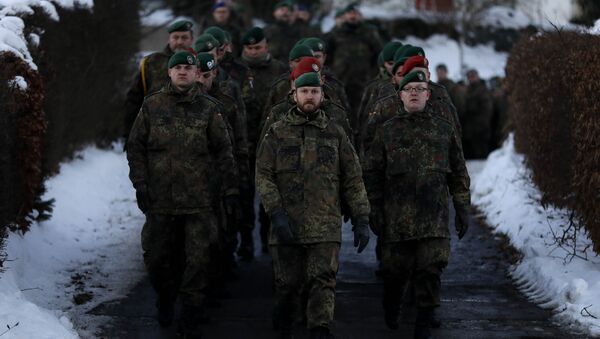Tilo Graser
The German public's stance on their country's security situation differs from the German authorities' thoughts on the matter, revealed the "Security Report 2018", presented on Wednesday in Berlin.
This difference pertains to who threatens world peace, with Germans believing that a much greater threat emanates from the US than Russia.
Klaus Schweinsberg of the Center for Strategy and Higher Leadership, who contributed to the report, recalled the speech of then-German President Joachim Gauck at the Munich Security Conference in February 2014.
READ MORE: Germany Calls on Providers of Internet to Share Data on Security Incidents
At the time, Gauk said that Germany should and wants to take on a "new responsibility" in the world. The population's understanding of this statement "differs significantly from understanding what was then presented as the purpose of the former federal government," Schweinsberg said.
Daesh Poses the Greatest Threat to Germany
He presented the report together with Renata Koecher, head of the Institute of Demoscopy in Allensbach (IfD). The past seven years have seen similar reports adding to attempts to understand and describe how the Germans feel in their country and abroad. More than 1,200 citizens over 16 years old took part in the latest report which was issued in January 2018.
According to Schweinsberg, despite appearing a secure country, Germans are most afraid of terrorism.
Most respondents (74 percent) named the Daesh (Islamic State) terrorist organization a threat to Germany, 48 percent pointed towards the conflict with North Korea, while 37 percent included the "conflict between Ukraine and Russia", according to the report.
The US on Second Position in Terms of the Degree of Threat to World Peace
However, putting threats directly to Germany to one side, the authors of the report were surprised to find out that 73 percent of German citizens believe that the greatest threat to world peace emanates from North Korea.
The fact that the United States was in second position, ahead of Iran, Turkey, Syria and Russia was "really overwhelming and worthy of attention," according to Schweinsberg.
READ MORE: Homegrown Terrorism Key Security Challenge for Germany — Vice Chancellor
Like public opinion researcher Renate Koecher, Schweinsberg attributed the results of the poll to the policy pursued by current US President Donald Trump.
In an interview with Sputnik, Schweinsberg also cited the population's ability to orient themselves in issues related to foreign and security policy.
He said that after the cancellation of military duty, such a "classic image of the enemy" as Russia was no longer drummed into the brains of the German population. In comparison with this, the mass media create it much more actively:
"In 2017, the US-related issues clearly dominated over topics pertaining to Russia. At the suggestion of the media, that was the year of the United States," Schweinsberg noted.
The US Image Changed by Trump
However, the United States is still viewed by 41 percent of the Germans as a major ally, with 37 percent pointing to France in this respect. Only 24 percent see the US as a "reliable ally", while almost 49 percent think differently.
Speaking to Sputnik, Koecher said that the US's image has changed dramatically in the last year and a half."
"Russia-related risks are perceived by the [German] population as a much smaller threat to world peace than those that come from the US. This is a completely unusual result, which we have not seen for decades," she underscored.
Only time will tell how Germany's policy will react to such conclusions.
The Fear of War Diminishes
According to the report, the Germans' war-related fears shrank and the Bundeswehr is given less attention than politicians would like to. Only 18 percent of respondents admitted that they would be seriously concerned over a war in which Germany could be involved. (In 2016, the figure stood at 24 percent).
The respondents mainly included elderly people and representatives of the so-called "poorly educated strata of the population."
"This impacts the importance attached to the armed forces," Schweinsberg explained.
Unlike the police, the Bundeswehr-related issues are currently considered less important given that the German military now has to grapple with its diminishing image. Military spending shifted to 11th position in the list of sectors for public investment, deemed necessary by German citizens. Military spending is even considered less important than measures on foreigners' integration.
READ MORE: Number of Left-Wing Extremists Rising in Germany – Internal Security Agency
He drew attention to the fact that in this regard, vague provisions of the new coalition agreement between the CDU/CSU bloc and the Social Democrats on arms-related issues coincide with the opinion of the population.
Moreover, there is "a widespread doubt about the Bundeswehr's combat capability," Schweinsberg said.
No Trust for NATO
Public confidence in the Bundeswehr and NATO has become a specific issue related to "the Security Report 2018" which cited 45 percent of the German population which still trust in the country's army.
45 percent of respondents, mainly from Eastern Germany, currently stick to this standpoint, while in 2007, the figure amounted to 34 percent.
Schweinsberg explained that German citizens seem to have realized the fact that acting all by themselves in the military field makes no sense.
In addition, he suggested that "it is in Germany's eastern federal states where NATO's mission has become more significant, which is also the case with the Baltic States."
On the other hand, it should have been mentioned that almost half of the Germans do not have confidence in NATO.
The report "Germany's Fears No. 1" focuses on internal security-related issues and on how the Germans perceive them.
The views expressed in this article are solely those of the speakers and do not necessarily reflect the position of Sputnik.




